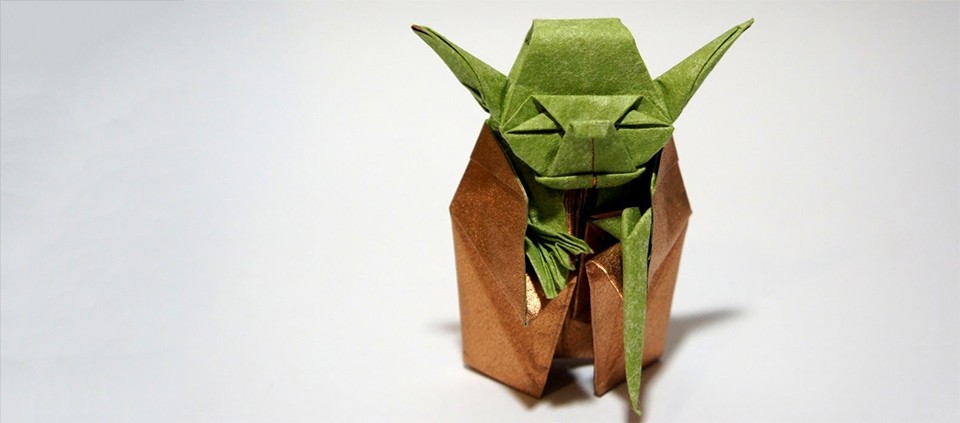A Long Time Ago, in a Galaxy Not So Far Away

I am three years old and in my sleeping bag on top of our station wagon at a drive-in movie theater about to see Star Wars: A New Hope. Everything is about to change. The startle of the opening music and swell of the title theme during the crawl pulls my consciousness into full alert. I am spellbound, in awe of the vastness of space and the figure of Darth Vader storming into the rebel cruiser surrounded by Storm Troopers and enveloped in smoke.
Fast forward a couple of years. I meet my very first yoga teacher. He is green, has pointy ears, and stands about three feet tall. Of course, I am referring to Yoda. In The Empire Strikes Back, Yoda teaches Luke Skywalker the ways of the Force from his swampy home on the planet Dagobah. Yoda’s lessons are filled with words of wisdom on selflessness, practicing nonattachment, and allowing the waves of emotions to roll through without directing your actions.
“Do. Or do not. There is no try.”
—Yoda, The Empire Strikes Back
One of the greatest lessons of the Jedi Master: Commit oneself to something completely, win or lose.
Yogic wisdom is imbedded in the very fabric of the entire Star Wars mythos. Designed by its creator, George Lucas, it addresses modern dilemmas such as our evolving relationship with technology and enduring questions about the nature of the Self and what happens when we die.
Lucas was light-years ahead of his time. Wouldn’t many of us benefit from putting our phones away and experiencing life directly, relying on our senses and instincts rather than on Siri and Google Maps? Like Luke, could we find empowerment and inspiration by letting go of our attempts to control our journey and instead put our faith in something greater than ourselves?
When Luke reached for his lightsaber in the snow on the planet Hoth and called it into his hand using Jedi telekinesis, I was astonished. For me, and many others, that scene is an iconic moment of spiritual cinema. Luke’s evolving relationship and study of the Force was Lucas’ nod to prana, the Tao, the Holy Spirit, and chi—the universal concept of life force found in many of the world’s traditions.
“Luminous beings are we, not this crude matter. You must feel the Force around you; here, between you, me, the tree, the rock, everywhere, yes.” —Yoda, The Empire Strikes Back
The first Star Wars was released in the 1970s, a time when participation in organized religion was declining. Many children were growing up without wisdom stories. Allegorical tales about good and evil, right and wrong—those that helped us understand our place within the universe—were fading. Without these stories, we can feel untethered, lost, and even numb to the potential life-affirming web of relationships we are imbedded within and called to nurture and protect. We may become vulnerable as a society to nihilistic and narcissistic tendencies. We risk raising generations of people who are not instilled with a sense of honor, service, wisdom, compassion and, perhaps most importantly, awe. Awe for the wonder of creation is one of the most precious gifts of the Star Wars tales.
What Star Wars provides is a form of mythological nourishment that people of every age are deeply hungry for right now. As a man who has sought his own personal relationship with Spirit and the Divine, I see Star Wars as a true inspiration. It is more than a movie to me; it is a beloved wisdom story alive with powerful archetypes that help me navigate the daily challenges and choices in my life.
Now that I have children of my own, Star Wars helps me make the teachings of yoga, meditation, and Eastern philosophy accessible to my kids, much like the Ramayana or the Bhagavad Gita do for children growing up in Hindu households. The hero Rama and his battle against Ravana; his loyal friend Hanuman; and his lover, Sita are relatable to the characters of Han Solo, Darth Vader, Chewbacca, and Princess Leia.
I look forward to being transported back onto the roof of my parent’s station wagon and feeling the wonder of watching a new Star Wars movie once again this weekend. I hope that the story stays true to Lucas’ original vision and that it continues to support our fundamental need for spiritual sustenance and the yogic lessons of balance, focus, and being in the now.
May the Force be with you!
Micah Mortali is lead Kripalu faculty, the Founder of the Kripalu School of Mindful Outdoor Leadership and author of Rewilding.
Full Bio and Programs